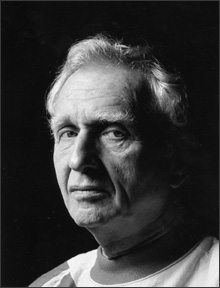
Alvin Epstein |
It’s fitting that Alvin Epstein should be cast in Beckett at 100, the centennial tribute to Samuel Beckett (1906–1989) that’s coming to Harvard next Thursday, since the venerable actor has been associated with the Nobel laureate’s plays for more than 50 years. Epstein and Mickey Solis will appear in three short plays that have been linked by director Robert Scanlan, professor of the Practice of Theatre in Harvard’s English Department. Martin Pearlman, founder and musical director of Boston Baroque, composed the score for the evening, which originated last year at New York’s 92nd Street Y Poets’ Theatre. The music is played live by violinist Gil Morgenstern, co–artistic director of Nine Circles Chamber Theater, which co-commissioned it.
Scanlan, who became Beckett’s friend for the last nine years of his life, explains, “Words and Music and Cascando are radio plays; . . . but the clouds . . . was written for television. No one but Beckett experts knows these plays at all. They are talking about the enormously difficult task of making art.”
Epstein, now 82, was cast as the hapless Lucky in the 1956 American premiere of Waiting for Godot that also starred Bert Lahr, E.G. Marshall, and Kurt Kasznar. He took the same role in a 1961 television movie, then moved on to play Estragon, opposite Jeremy Geidt’s Vladimir, in the memorable 1995 staging of the work by the American Repertory Theatre. Epstein was a member of the ART ensemble from 1980 (he directed the first production) until 2004.
Recalling the 1956 Godot, he says, “The run was extended for 11 weeks, because people kept coming.” Brooks Atkinson’s New York Times review can’t have hurt: he famously called the opaque work “a mystery wrapped in an enigma.” “We only closed because summer was coming, and Bert refused to continue without air-conditioning the theater. No one could afford to do that.” Epstein went on to play Clov in the first American production of Endgame, eventually adding two more of that work’s four roles to his résumé. He never met Beckett, but when he directed an Endgame, he did speak by phone with the playwright in Paris. “He wanted to know what I would do with the play.”
Epstein says it’s hard to put the meaning of Beckett’s plays into words without resorting to clichés. “I think Beckett has an uninterrupted channel into the soul of modern man, the joys, the sorrows, the hopes, the dreams of everybody in the Western world. The plays are terribly instinctive, terribly true. We all live in expectation of things that will never happen.”
And though he wasn’t in the New York production and hasn’t studied these short pieces, he’s not worried. “I trust Beckett. When you begin working on the plays, you recognize them in your gut.”
Beckett at 100 | New College Theatre, Harvard University, 10-12 Holyoke St, Cambridge | November 15-18 | $25; $15 Harvard affiliates, seniors; $10 students | 617.496.2222
On the Web
New College Theatre: www.boxoffice.harvard.edu